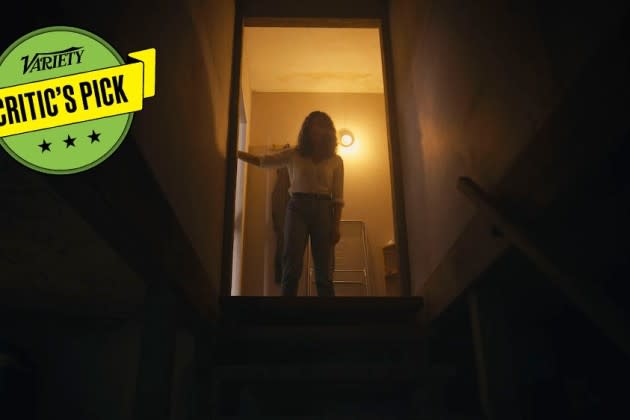‘Barbarian’ Review: Knock, Knock. Who’s There? A Ratched New Horror Classic

Imagine showing up for an Airbnb rental, only to discover that another guest is already there. What would you do? Check in anyway and hope for the best? Or take the mix-up as a sign and get the heck out? In “Barbarian,” Tess (Georgina Campbell) makes the wrong decision. It’s already late, and she decides to stay — this despite the fact that the stranger sharing the house is played by Bill Skarsgård (the actor who embodied Pennywise in the recent “It” remake). For audiences, this casting is a clue Tess is in for a scary stay. But it would be wrong to think you have “Barbarian” figured out.
For Tess, there are plenty of other red flags in the way her unexpected roommate behaves. Should she really believe they double-booked the same place in a derelict Detroit neighborhood? Or is there another reason he’s there? What if he’s some kind of rapist or ax murderer? Is the flimsy lock on her bedroom enough to protect her should he turn violent? Tess does have certain survival instincts (she’s sharp enough to decline a drink from this guy, who calls himself “Keith”), and she has empathy, too, which will become kind of a defining characteristic later on, when things get super-crazy and you just want her to get out of town as fast as possible.
More from Variety
Writer-director Zach Cregger assumes you’ve seen “Psycho” or, if not, that the psychic trauma of that film has seeped into our culture enough that no 21st-century woman travels without worrying to some degree that any sweet, seemingly nonthreatening stranger she meets on the road could be a serial killer. Like that Alfred Hitchcock classic, “Barbarian” also resets abruptly after a long and misleading first act. Set in Detroit’s all-but-abandoned Brightmoor district, this lead-in is deliciously uncomfortable, playing on fears that women aren’t safe among unknown men — but it’s not at all indicative of where the film is headed. (The gnarly but curiously unspecific title is even less helpful in preparing the viewer.)
Yes, there is a monster lurking in this house, but it’s not this man, and no man can help Tess defeat it. To Cregger’s credit, the sense of dread he creates is the stuff that the very best horror movies are made of. For female audiences, this corresponds to a real-world fear of how not to become a #MeToo victim, then blindsides us with a very different kind of terror.
That first night, Tess notices a door at the end of the hallway that seems to open by itself. The next day, against her better judgment, she opens it to discover an ominous basement untouched by whatever cozy attention their hosts put into the main house. Downstairs, there are hallways, tunnels and secret passages probably best left unexplored — not that it stops her from investigating. Around one dark corner, Tess discovers a detention room of some kind, abandoned except for a dingy cot, old camera and grimy handprint on the wall. What kind of nightmare fodder happened here? If she gets out alive, should she mention the torture chamber in her guest review?
Just as audiences are starting to feel attached to Tess and Keith, Cregger abruptly cuts to the Hollywood jerk who owns the house, AJ (Justin Long), smugly driving along the California coast. While on the phone with his reps, he’s suddenly hit with the thing 21st-century males seem to dread most: accusations of sexual misconduct. Everything was going great in his career, and now, faster than you can say “canceled,” all his projects are on hold. Even his manager is cutting ties. Cregger was clever to enlist Long for such a role, since the actor is enormously likable but doesn’t shy away from playing creeps (as in suspended-educator drama “After Class” or Neil LaBute’s toxic masculinity comedy “House of Darkness”).
For a time, Cregger abandons Tess’ story to focus on AJ’s arrival. The tonal shift from someone we cared about to this tool is alarming, deliberately so. Here, instead of worrying about what will become of the character, audiences may find themselves rooting for something terrible to happen. Cregger sets up all kinds of complicated feelings as AJ’s escalating douchebaggery takes the place of the smarter, subtler opening act. Rest assured, he fully intends to pay off those frustrations, bringing the two storylines together via a third — a Brian De Palma-style flashback set decades earlier, in which a predator preys on local women.
Cregger’s instinct for suspense is so effective, it’s hard to believe that before “Barbarian,” the helmer worked largely in comedy (he was a member of the Whitest Kids U’Know sketch team). Then again, a deliciously twisted sense of humor runs beneath the surface. In fact, the image of someone (or something) running beneath the surface is one of the film’s most outrageous thrills. Audiences may be expecting something supernatural, but here too, “Psycho” seems to be the reference point, as “Barbarian” builds shock upon shock, giving viewers another mother they won’t soon forget.
Best of Variety
Sign up for Variety’s Newsletter. For the latest news, follow us on Facebook, Twitter, and Instagram.
